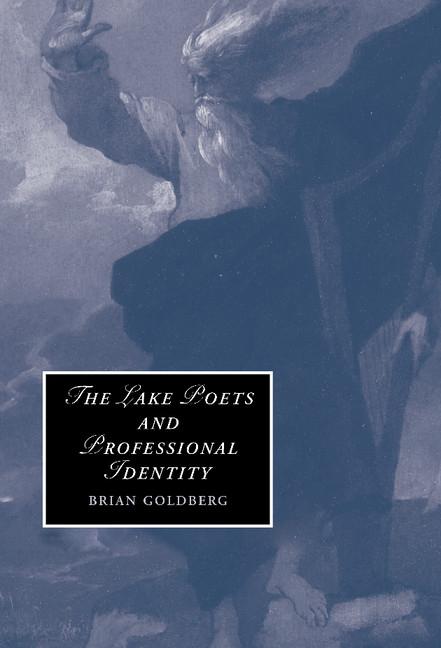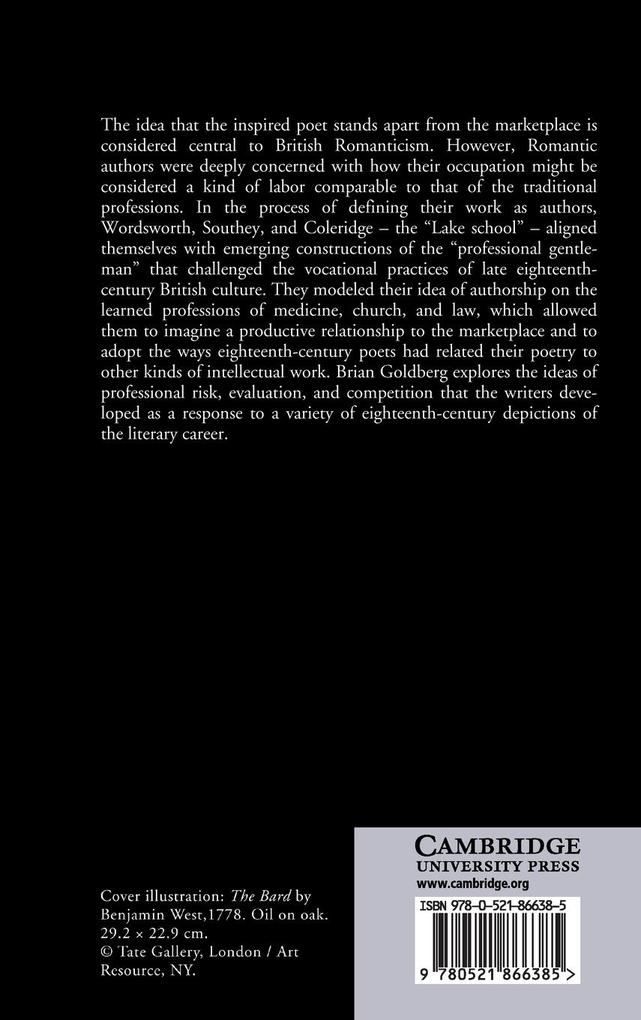
Zustellung: Fr, 06.06. - Mi, 11.06.
Versand in 1-2 Wochen
VersandkostenfreiBestellen & in Filiale abholen:
The idea that the inspired poet stands apart from the marketplace is considered central to British Romanticism. However, Romantic authors were deeply concerned with how their occupation might be considered a kind of labour comparable to that of the traditional professions. In the process of defining their work as authors, Wordsworth, Southey and Coleridge – the 'Lake school' – aligned themselves with emerging constructions of the 'professional gentleman' that challenged the vocational practices of late eighteenth-century British culture. They modelled their idea of authorship on the learned professions of medicine, church, and law, which allowed them to imagine a productive relationship to the marketplace and to adopt the ways eighteenth-century poets had related their poetry to other kinds of intellectual work. Brian Goldberg explores the ideas of professional risk, evaluation and competition that the writers developed as a response to a variety of eighteenth-century depictions of the literary career.
Inhaltsverzeichnis
Acknowledgements; Introduction: professionalism and the Lake School of Poetry; Part 1. Romanticism, Risk, and Professionalism: 1. Cursing Doctor Young, and after; Part II. Genealogies of the Romantic Wanderer: 2. Merit and reward in 1729; 3. James Beattie and The Minstrel; Part III. Romantic Itinerants: 4. Authority and the itinerant cleric; 5. William Cowper and the itinerant Lake poet; Part IV. The Lake School, Professionalism, and the Public: 6. Robert Southey and the claims of literature; 7. 'Ministry more palpable': Wordsworth's Romantic professionalism; Notes; Bibliography; Index.
Produktdetails
Erscheinungsdatum
18. Februar 2015
Sprache
englisch
Seitenanzahl
312
Autor/Autorin
Brian Goldberg
Verlag/Hersteller
Produktart
gebunden
Gewicht
659 g
Größe (L/B/H)
235/157/23 mm
ISBN
9780521866385
Entdecken Sie mehr
Pressestimmen
"Brian Goldberg's richly instructive new study, The Lake Poets and Professional Identity, considerably deepens an ongoing conversation about the professionalization of the poet in the Romantic era. He confirms the complexity of the Romantic poets' stance toward the literary marketplace,..." -Sarah M. Zimmerman, Fordham University "Collectively and individually, the Lake poets looked back to the examples of eighteenth-century predecessors-Savage, James Beattie, and William Cowper, in particular-both as representatives of a fading systemthat still held the appeal of relative stability and as protoprofessional figures already engaged in theorizing the terms of a new independence." -Sarah M. Zimmerman, Fordham University "Goldberg's argument is built on nuance, half-identifications, and subtle differentiations,moving between text and career repeatedly to account for the Lake poets' tenacious efforts to forge a new professionalism. This methodology succeeds in generating a thick fabric of poetic and biographical allusion but sacrifices some of the broader contours, both historical and argumentative." -Sarah M. Zimmerman, Fordham University "The primary benefit of this critical approach is the argument's seamlessness; Goldberg weaves an intricate, substantive account of the poets' sustained efforts in the late 1790s to create a new professional paradigm that should have us rereading their works for informative glimpses of that work in progress." -Sarah M. Zimmerman, Fordham University
Bewertungen
0 Bewertungen
Es wurden noch keine Bewertungen abgegeben. Schreiben Sie die erste Bewertung zu "The Lake Poets and Professional Identity" und helfen Sie damit anderen bei der Kaufentscheidung.











